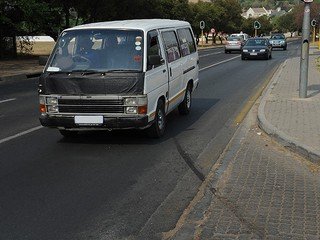Taxis to despair
Updated | By tanstan fourie

The recent accident on the North Coast in which fifteen people lost their lives is a pretty grim account of what happens on our roads on a daily basis. Our road safety policies are a joke, if in existence at all; and in fact South Africa has a bad reputation internationally when it comes to road carnage and much of this is because of the sheer number of accidents on our roads involving public transport.
So ministers and other members of government rush to the scenes of accidents to commiserate with the families of those innocent passengers who lose their lives but where are they when licences are being sold at testing stations, when mini bus taxis that are not roadworthy hit the streets? Where is government’s education policy on road safety or programmes around passenger’s rights? Do they check if a taxi driver is displaying his PDP or public driver’s permit?
The fact of the matter is that these truths are not new. In fact the World Health Organisation has in years 2000 and 2011 endorsed the reality that South African drivers, in particular those in the bus, mini bus and coach industry, have a reputation for having one of the worst accident rates in the world.
An article I read about the issue says that the popular belief is that taxi drivers’ behaviour – their aggressive driving and disdain for the rules – provides an intuitive and logical explanation for why South Africa’s roads are so dangerous. And the statistics support this. Taxis account for three times more fatalities than cars.
According to Arrive Alive, taxis are the most popular mode of transport in urban areas for the majority of South Africa’s population. And the South African taxi industry plays an important role in the economy considering that the majority of South Africans are poor and dependent on public transport.
The taxi industry consists of minibuses, dominating 90% of the market, and metered taxis active in the remaining 10% of the market. Public transport by taxis account for 65% of the transport total, 20% by bus and 15% by rail.
The industry consists of approximately 150 000 public minibus taxis. The South African taxi industry is estimated to have a turnover of more than R16,5 billion a year. With the minibus taxi industry in South Africa is comprised of more than 20 000 owners and 200 000 employees.
And of the 36 lives lost daily on our roads – 3 are killed in taxi related incidents.
So if we know all this, why aren’t there stricter laws that govern this industry? In my opinion, our very own Metro police bear a large portion of this responsibility. I was on a story at the taxi rank in town about a month ago when a couple of taxi drivers approached my cameraman and I suggesting we do a story on how the Metro police were fleecing these operators by way of asking for bribes.
These men, all of whom were so fed up with this scourge, were willing to wear hidden cameras to catch these officers in the act. In fact, one of them said he carries a stash of cash in a shopping bag under his seat, which he referred to as “Metro money”.
While this is unconscionable in itself, I took umbrage to the fact that these Metro officers allegedly pulled them off the road on a daily basis telling them to pay a bribe or face having the taxi impounded because there were “things wrong with them”! These ranged from mechanical to roadworthy issues.
So if the taxi was not roadworthy, should it not have been taken off the road anyway so that it’s not a danger to the driver and his passengers? If it was impounded, perhaps the kinds of accidents we see on the roads on a daily basis won’t take place. Is this not a basic requirement in the job description of a Metro policeman on the beat?
Metro police better beware. I’m going undercover in the next few weeks and I will be naming and shaming these men and women that are disgracing their uniform! In the meantime, lives continue to be lost on our roads. Something must be done. And quickly!
What are your thoughts?
You can email Terence Pillay at [email protected] or follow him on Twitter: @terencepillay1 and engage with him there.
Show's Stories
-
South Africans are far poorer than world average income
South Africa's economic growth has been sluggish since 2010, leaving mil...
Stacey & J Sbu an hour ago -
Sassa cracks down on undisclosed income among grant recipients
Sassa has taken action against undisclosed income among grant recipients...
Stacey & J Sbu 2 hours ago